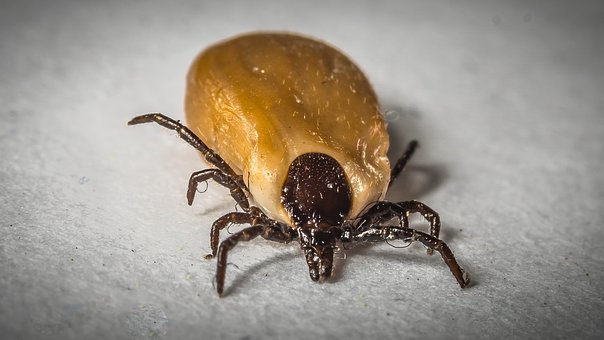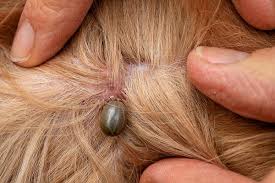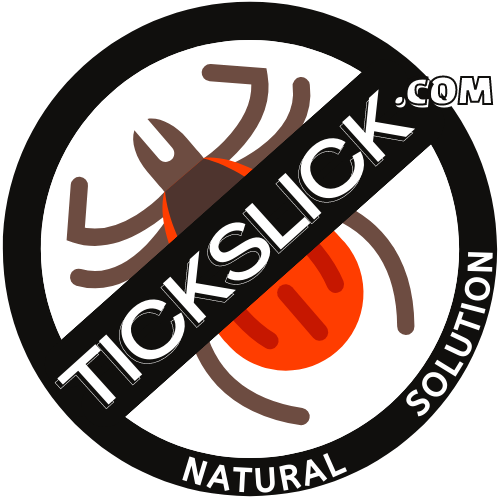Tick-Borne Diseases Effecting Equines:
Tick-borne diseases are becoming more common and unfortunately there are nearly 900 species of ticks. There are three (known) tick-borne diseases that effect equines.

Anaplasmosis:
(also called ehrlichiosis, tick-borne fever, and pasture fever) is caused by anaplasma phagocytophilum,. This disease effects horses, cattle, dogs, humans, and other mammals.
Anaplasmosis is the tick-transmitted disease that most commonly causes illness in horses. These bacteria live inside certain blood cells (granulocytes).
In horses clinical signs usually appear 10-45 days after infection. Fever is typically accompanied by limb swelling and the appearance of small hemorrhages on the mucous membranes of the nose, mouth, eyes, or vulva.
It can also cause anemia, lameness, lethargy, ataxia (uncoordinated movements), lack of appetite with digestive pain.
As with many other tick-borne diseases the symptoms are not specific and may easily be confused with a myriad of other diseases or disorders.
Diagnosis will require a blood sample to be studied with a microscope and/or serological tests.

The disease can be fatal if not treated.
Antibiotic treatment is usually very effective if the horse is treated soon after the signs of illness begin.
There is no vaccine for this disease so a horse owners best defense is to minimize their horses risk of exposure to ticks.
Lyme disease:
caused mainly by the bacterium Borrelia burgdorferi. This disease affects humans, dogs, horses and other mammals.
Clinical signs are quite variable and may include fever, anemia, swelling of joints, edema, lameness and even encephalitis.
Symptoms are not specific and may be confused with other diseases, as is often the case with tick-borne diseases.
Diagnosis requires specific microscope and/or serological tests.
Some horses are exposed to this organism through tick bites and yet do not end up developing clinical illness.
Clinical signs of this disease usually take months to present themselves.
Again, there are no vaccines for horses for this disease, so preventing your horse from getting bitten by ticks is the best course of action for a horse owner to implement.
Piroplasmosis:
(also called babesiosis) is caused by Babesia caballi and is commonly found in America, Europe and Asia.
Transmitted by several species of ticks. Infected animals may have few to no clinical signs.
It can cause anemia and jaundice, lack of coordination and restlessness. Paralysis due to harm to the central nervous system is common. Walking in circles may also occur. Fatalities are possible.
Antibiotics are generally used as well as anti-parasitic drugs, but the general consensus is that the horse’s body will never be clear of these organisms.
And again, symptoms are difficult to diagnose as they are similar to many other health concerns
and they may require specific microscopic and/or serological testing.
Ticks-Off Pesticide Free Solution
- Effective immediately and continues deflecting ticks for up to one week, or longer.
- No fear of negative side effects!
- FREE 32 ounce SPRAY BOTTLE WITH EVERY ORDER.
- Oil-Free. Leaves no residue. Quick drying.
- Can be used on a wet or dry coat.
- Safe to use in combination with any and all other pest prevention products.
- Use to easily remove stickers and tangles.
- Deflects Bot Fly eggs from attaching to horses and livestock.
- Deters dirt and creates a coat that will look and feel better than ever!
- Grooming time may be cut by up to 80%.
- Use to prevents static electricity in horses tails and winter blankets!
- Ticks-Off lavender scent is pleasant and calming, and it naturally deflects ticks.
Ingredients:
Disclaimer: Ticks-Off, nor any third party associated with, related to, or linked to their businesses or websites, expressly disclaims any responsibility for, and makes no representations or warranties regarding, any statement, information, materials, or content found on or included in Ticks-Off’s marketing materials/websites, or any third party marketing materials/websites related to, associated with or linked to Ticks-Off’s business or website. Ticks-Off’s website and blogs are not intended to diagnose or treat any health conditions. They are meant solely for informational purposes. Please seek veterinary advice for any health concerns or problematic conditions. These statements have not yet been approved by the FDA.
